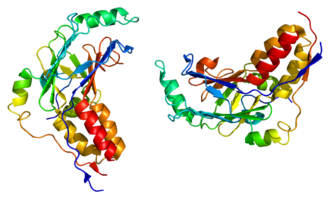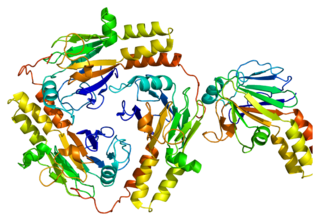
Mothers against decapentaplegic homolog 1 also known as SMAD family member 1 or SMAD1 is a protein that in humans is encoded by the SMAD1 gene.
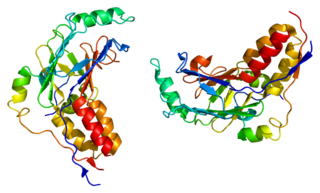
Mothers against decapentaplegic homolog 2 also known as SMAD family member 2 or SMAD2 is a protein that in humans is encoded by the SMAD2 gene. MAD homolog 2 belongs to the SMAD, a family of proteins similar to the gene products of the Drosophila gene 'mothers against decapentaplegic' (Mad) and the C. elegans gene Sma. SMAD proteins are signal transducers and transcriptional modulators that mediate multiple signaling pathways.
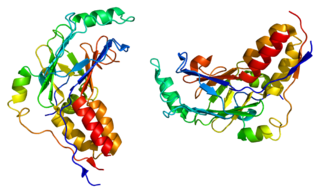
Mothers against decapentaplegic homolog 3 also known as SMAD family member 3 or SMAD3 is a protein that in humans is encoded by the SMAD3 gene.

SMAD4, also called SMAD family member 4, Mothers against decapentaplegic homolog 4, or DPC4 is a highly conserved protein present in all metazoans. It belongs to the SMAD family of transcription factor proteins, which act as mediators of TGF-β signal transduction. The TGFβ family of cytokines regulates critical processes during the lifecycle of metazoans, with important roles during embryo development, tissue homeostasis, regeneration, and immune regulation.
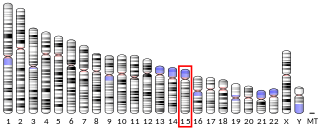
SMAD family member 6, also known as SMAD6, is a protein that in humans is encoded by the SMAD6 gene.

Mothers against decapentaplegic homolog 5 also known as SMAD5 is a protein that in humans is encoded by the SMAD5 gene.

Mothers against decapentaplegic homolog 7 or SMAD7 is a protein that in humans is encoded by the SMAD7 gene.

Mothers against decapentaplegic homolog 9 also known as SMAD9, SMAD8, and MADH6 is a protein that in humans is encoded by the SMAD9 gene.
Smads comprise a family of structurally similar proteins that are the main signal transducers for receptors of the transforming growth factor beta (TGF-B) superfamily, which are critically important for regulating cell development and growth. The abbreviation refers to the homologies to the Caenorhabditis elegans SMA and MAD family of genes in Drosophila.
Decapentaplegic (Dpp) is a key morphogen involved in the development of the fruit fly Drosophila melanogaster and is the first validated secreted morphogen. It is known to be necessary for the correct patterning and development of the early Drosophila embryo and the fifteen imaginal discs, which are tissues that will become limbs and other organs and structures in the adult fly. It has also been suggested that Dpp plays a role in regulating the growth and size of tissues. Flies with mutations in decapentaplegic fail to form these structures correctly, hence the name. Dpp is the Drosophila homolog of the vertebrate bone morphogenetic proteins (BMPs), which are members of the TGF-β superfamily, a class of proteins that are often associated with their own specific signaling pathway. Studies of Dpp in Drosophila have led to greater understanding of the function and importance of their homologs in vertebrates like humans.
Medea is a gene from the fruit fly Drosophila melanogaster that was one of the first two Smad genes discovered. For both genes, the maternal effect lethality was the basis for selection of their names. Medea was named for the mythological Greek Medea, who killed her progeny fathered by Jason.

The SKI protein is a nuclear proto-oncogene that is associated with tumors at high cellular concentrations. SKI has been shown to interfere with normal cellular functioning by both directly impeding expression of certain genes inside the nucleus of the cell as well as disrupting signaling proteins that activate genes.

SNW domain-containing protein 1 is a protein that in humans is encoded by the SNW1 gene.

Ski-like protein is a protein that in humans is encoded by the SKIL gene.

Homeobox protein Hox-C8 is a protein that in humans is encoded by the HOXC8 gene.

E3 ubiquitin-protein ligase SMURF2 is an enzyme that in humans is encoded by the SMURF2 gene.

Forkhead box protein H1 is a protein that in humans is encoded by the FOXH1 gene.

Anaphase-promoting complex subunit 10 is an enzyme that in humans is encoded by the ANAPC10 gene.

E3 ubiquitin-protein ligase Arkadia is an enzyme that in humans is encoded by the RNF111 gene.
